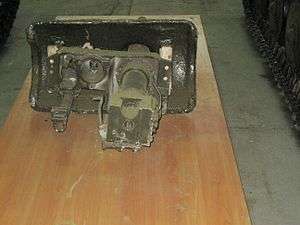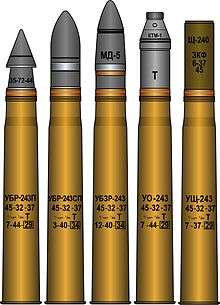45 mm anti-tank gun M1932 (19-K)
| 45 mm anti-tank gun model 1932 (19-K) | |
|---|---|
|
45 mm anti-tank gun M1932, displayed in Finnish Tank Museum in Parola. | |
| Type | Anti-tank gun |
| Place of origin | USSR |
| Production history | |
| Produced | 1934–1937 |
| No. built | 21564+ |
| Variants |
20-K tank gun 21-K AA gun |
| Specifications | |
| Weight | combat: 414 kilograms (913 lb) |
| Length | 6.4 m |
| Barrel length | 46 calibers (2,070 mm) |
|
| |
| Shell | 2.15 kilograms (4.7 lb), rimmed cartridge |
| Caliber | 45 mm (1.77 in) |
| Recoil | 690 mm |
| Carriage | split trail |
| Elevation | -8° to 25° |
| Traverse | 60°[1] |
| Rate of fire | 15 rpm |
| Muzzle velocity | 335 metres per second (1,100 ft/s) (for fragmentation shell) |
| Maximum firing range | 4.4 km (2.73 mi) |
The 45 mm anti-tank gun model 1932 (factory designation 19-K and GRAU index 52-P-243A) was a light quick-firing anti-tank gun used in the interwar period and in the first stage of the German-Soviet War. It was created by factory No. 8 which was located in now Korolyov city, under leadership of engineer V. Bering.
History
The gun bearing factory designation 19-K (Cyrillic 19-К) was a combination of a modified carriage of the 37 mm anti-tank gun model 1931 (built according to a documentation bought from Rheinmetall) with a 45 mm barrel designed in March 1932.[2] and adopted by Red Army 23 March 1932.[3] The reason for selecting 45 mm caliber was the large reserves of the French 47 mm shells which can be converted to 45 mm by milling out the driving bands. The resulting light quarter-automatic anti-tank gun was discovered to be unsatisfactory due low mobility and reliability problems, and after a series of modifications (including arrest of chief designer 10 August 1933 after several production defects were uncovered), was re-sent to army trials 26 December 1933. The resulted semi-automatic improved version was known as "45 mm anti-tank gun M1934" (Russian: 45-мм противотанковая пушка образца 1934 года). These guns were deemed obsolete in 1937 and were replaced by 45 mm anti-tank gun M1937 (53-K). The tank gun modification Russian: 45-мм танковая пушка образца 1932/38 годов (20-К) was still in use in the first stage of the German-Soviet War.
The gun carriage was upgraded from wooden wheels to automobile GAZ-A pneumatic wheels in 1934, and sponge tires were used since 1936, raising total gun weight to 560 kg. The evolution from the 19-K to 53-K gun was rather gradual, with improvements incorporated in production lines several times.
Tank gun 20-K
The gun was installed in tanks under the name 45 mm tank gun model 1932 (20-K). In 1934, the gun was improved with half-automatic breech instead of original quarter-automatic. Other changes were elevation mechanism and recoil system. It was used on a wide variety of Soviet tanks and fired the same ammunition as the anti-tank version. The gun was later improved into the 45 mm tank gun model 1938, which had electric firing system and a TOS stabilized (in vertical plane only) gun sight, allowing for accurate fire while the tank was in motion. The gyro stabilizer was deleted from design in 1941 due inexperienced tank crews simply switching stabilization off.
| year | produced |
|---|---|
| 1932 | 10 |
| 1933 | 2099 |
| 1934 | 2005 |
| 1935 | 2443 |
| 1936–40 | 15007 |
| 1941 | 2759 |
| 1942 | 5090 |
| 1943 | 3040 |
Tanks and armoured cars which mounted this gun include:

Anti-aircraft gun 21-K
The barrel of the 19-K was placed on a pedestal mount and used by the Soviet Navy as an anti-aircraft gun beginning in 1934. It was not very effective in this role since it had to be loaded by hand, which kept its rate of fire down to about 25–30 rounds per minute, and its lack of a time fuze meant that it had to score a direct hit to damage its targets.
Ammunition

- Ammunition types:
- UBR-243P – subcaliber armor-piercing
- UBR-243SP – armor piercing
- UBZR-243 – armor piercing incendiary
- UO-243 – fragmentation
- UssH-243 – shrapnel
References
- ↑ "45-мм противотанковая пушка 1937 года | Энциклопедия оружия". war-arms.info. Retrieved 2016-12-29.
- ↑ "45-мм танковая пушка обр.1932/38 – BATTLEFIELD.RU – всё о Великой Отечественной войне". battlefield.ru. Retrieved 2016-12-28.
- ↑ "45-мм противотанковая пушка Беринга 1932 года | Энциклопедия оружия". war-arms.info. Retrieved 2016-12-29.

